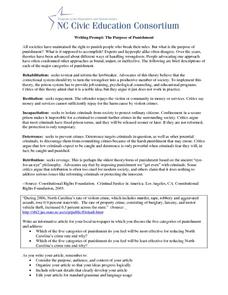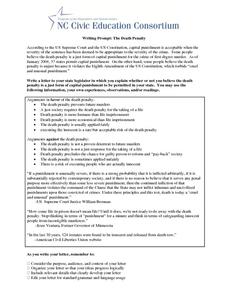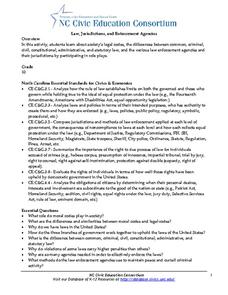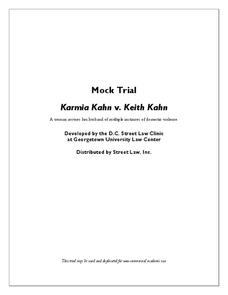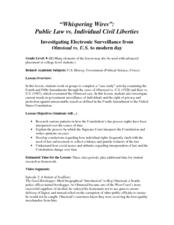Carolina K-12
Writing Prompt: The Purpose of Punishment
When punishment is given in a society when a member breaks its rules, what is it meant to accomplish? After summarizing the significant categories of punishment (rehabilitation, restitution, incapacitation, deterrence, and retribution),...
Carolina K-12
Writing Prompt: The Death Penalty
Is the death penalty unjust because it violates the Eighth Amendment of the United States Constitution, "cruel and unusual punishment"? Or is it just a form of permissible capital punishment? After weighing arguments for and against the...
Carolina K-12
Law, Jurisdictions, and Enforcement Agencies
How do you determine what law enforcement agency has jurisdiction when a crime has been committed? That's the challenge facing class members in this role-play activity.
DocsTeach
Court Packing vs. Reorganizing: The Supreme Court in the New Deal
Travel back in time to understand the effects of FDR's New Deal on the Supreme Court. Academics analyze historical documents to understand FDR's attempts to pack the Supreme Court and the opposition he faced. The activity includes a...
Teaching Tolerance
Dismantling Racial Caste
It's time to end racism. The final installment of the series encourages scholars to consider what is needed to ended the racial caste system in the U.S. Young historians complete group discussion, written prompt, and a hands-on-activity...
Teaching Tolerance
Parallels Between Mass Incarceration and Jim Crow
Is history repeating itself? A riveting lesson examines the parallels between mass incarceration in the U.S. and the Jim Crow Laws of the past. Academics review Jim Crow Laws and compare them to mass incarcerations of African Americans....
Teaching Tolerance
Understanding the Prison Label
Break the chain. An engaging lesson plan examines why it is so hard to break free of the prison system in the US. Academics participate in a reader's theater, read primary sources, and discuss their thoughts. The lesson plan explains the...
Teaching Tolerance
Racial Disparity in the Criminal Justice System
Explore the impact of the war on drugs in a thought-provoking lesson for high school academics. Young historians delve into the world of the criminal justice system and the racial disparity that occurs in the US. The resource provides...
Teaching Tolerance
The War on Drugs—Mechanisms and Effects
The war on drugs doesn't have definite results. An interesting lesson examines the social, political, and economic effect of the war on drugs. Academics learn how the war on drugs has led to mass incarcerations and negatively affected...
Teaching Tolerance
Introducing 'The New Jim Crow'
When Jim Crow Laws ended, the intent behind them did not. Academics read "The New Jim Crow Laws" and an interview from the author to understand how racism has not ended, but rather changed over time. The lesson explains how prejudices in...
Judicial Branch of California
The Power of the Press: The First Amendment
Was what happened in 1886 at the Haymarket riot a crime or a case of xenophobia? Using political cartoons from the time, young historians consider the role the media played in anti-labor sentiment during the time and how that influenced...
Judicial Learning Center
Your 4th Amendment Rights
Americans love to learn about their rights, especially those that protect them from the government's power to invade their privacy. Young people are especially engaged by this topic. An informative lesson explores four Supreme Court...
Judicial Learning Center
Types of Court Cases
How can one court acquit someone of a crime, while another convicts the person of the same one? It's all because of the differences between civil and criminal trials. An informative resource provides scholars in the field of criminology...
Judicial Learning Center
Getting Ready for Trial
A courtroom can be a scary place for the uninitiated. Get familiar with the process using a helpful overview of the activities that take place prior to both civil and criminal cases. The lesson explains the differences between...
Judicial Learning Center
Your Day in Court: Criminal Justice
When a person goes on trial for a crime, what options does a court have to render justice? Who are the key players in the legal system? Interested legal scholars answer the inquiries and more using an Internet-based activity, chart, and...
Street Law
Mock Trial - Kahn v. Kahn
A woman accuses her husband of multiple instances of domestic violence in the mock trial case, Karmia Kahn v. Keith Kahn
Curated OER
4-H Citizenship Activity Page - Beginning Level
This is a 4-H citizenship activity that asks learners to examine county government, city councils, the three branches of the United States government, and complete a community service project. It also includes a word search,...
Curated OER
Convince that Jury (Inspired by Roald Dahl's
What happened to a murder case when the police eat the murder weapon? After reading Roald Dahl's dark and ironic short story "Lamb to the Slaughter," students write a persuasive essay to convince a jury that the wife who killed her...
Curated OER
Art On Trial (A Mock-Court Activity)
Students engage in a mock trial to decide if a work of prospective public art is "art" and accepted for a city park. They broaden their definitions of what "art" is. Students distinguish between opinion and informed judgment of art works.
Curated OER
Introduction to Mock Trials
Fifth graders participate in a mock trial and explore the vocabulary of a courtroom.
Curated OER
"Whispering Wires": Public Law vs. Individual Civil Liberties
High school student love discussing controversial issues like those brought up in this fourth amendment case study. They examine the 1928 Olmstead vs. U.S. prohibition court case, applying the fourth amendment to determine whether...
Curated OER
Arrest
Young scholars become active participants in the legal process as they take on the roles of witnesses, jurors, and defendants in a trial simulation. An understanding and appreciation of the legal system is fostered through the experience.
Curated OER
Espionage and Sedition Acts: Mock Trial
Bring to life the severity of the Espionage and Sedition Acts through a mock trial. Learners have prior knowledge of WWI and the context of these acts. An anticipatory set gets the class discussing the ethics of wartime dissension, and...
Curated OER
Arrest- A Legal System Simulation
What would your class do if a police officer arrested a student in class? This is exactly the anticipatory set that gets learners engaged in a unit on the legal system. The plan is to get the officer to simulate an arrest, and then guest...
